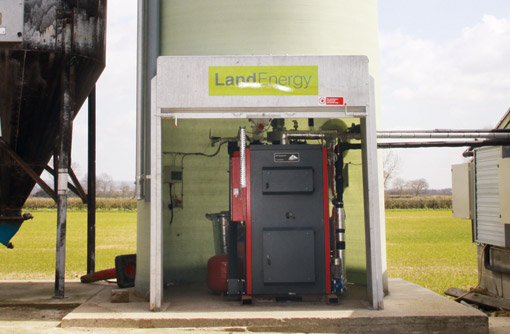Integrated system offers energy savings

A North Yorkshire poultry farming family has made financial savings and increased the predictability of future input costs, by moving from oil heating to a biomass wood boiler which relies on wood pellets.
Reg Marton farms with his son, Simon, and grandson, Andy, at Rise Farm, Great Barugh, near Malton. A poultry enterprise was added to the farm business some 50 years ago and the family currently produce 500,000 broilers from six crops of birds each year, as well as growing arable crops and running a contracting business.
Mains gas is not available in the area, so oil had always been used to heat the sheds. “The price of heating has rocketed over the past two years and our margins, which were already tight, were being eroded. An attempt to cut down on oil consumption did not work out, as it had a detrimental effect on growth rates.
“The market for oil is extremely volatile and seems to be moving in only one direction – upward. This was making it difficult to predict input costs for any length of time ahead, with a similar effect on profitability.”
The Martons approached family friend and neighbour, Peter Teasdale, who is a director of Land Energy, an integrated wood pellet business which offers producers a range of options for heating their sheds. The family chose a contract which gave them a free energy system, including a boiler, pellet storage facility, thermostatically-controlled hot water heaters, computer equipment and a network of pipes. Design and installation were also part of the deal.
The system, which has been operating since last August, provides all the energy required to heat the poultry housing. Hot water is dispersed through a series of metal pipes with fins attached, although underground pipework can also be installed, in cases where there is insufficient room to build heat centres attached to individual sheds.
Another element of the contract covers the costs associated with equipment cleaning, servicing and maintenance, plus related insurance premiums. Land Energy takes the Renewable Heating Incentive payments, which are offered for sustainable heating projects and linked to the level of energy generated.
In return, the Martons commit to a 10-year arrangement, which involves making an agreed fixed monthly payment, linked to the quantity of wood pellets used. This represents an approximate 20% saving in energy costs compared with oil heating, based on current prices. The monthly fee is reviewed annually and is adjusted only to take account of inflation. The contract allows the Martons to fix their heating costs for a decade ahead, irrespective of oil or biomass price increases.
The contract also permits the family to use up to 10% more wood pellets at no extra cost. This means that, in an exceptionally cold winter when spot oil prices usually rise sharply, their financial commitment remains stable.
The maximum quantity of the wood pellets held in storage for each shed is 10t, which will last for two weeks at peak times of the year. Pellet levels are monitored remotely, with fresh supplies delivered by blower truck. The system uses 6mm pellets, to facilitate their movement by auger from the store to the boiler.
“The current arrangement is working well,” says Mr Marton. “If we had carried on using oil, or purchased a wood pellet heating system independently, we would have been left without any protection against energy price fluctuations.
“The idea of a wood-fuel boiler appealed to us; the option we chose involved no capital expenditure and gave us the opportunity to help the environment by minimising the farm’s carbon emissions.”
Woodfuel produces dry heat, compared with gas or oil, offering potential savings on litter and reducing humidity within the housing. A “weight for age” improvement rate of 5-10% is also reported, along with the potential for cutting down pododermatitis.
While many renewable heating systems depend on wood pellets, farmers can also use woodchips, taken from their own trees. It is generally recommended that virgin wood is used, as waste woodchip can cause problems with emission levels, to which legal restrictions apply.
Land Energy
Peter Teasdale farms near Helmsley and previously grew 1,000 acres of potatoes. Having always been interested in “green” issues, particularly climate change and the dwindling supply of fossil fuels, he set up Land Energy in 2006 with Richard McLane and John Westmacott. The company is focused on vertical integration, having its own contracts to secure long-term wood supplies, a wood pellet factory (with two more due to come on line), and a range of biomass heating equipment, which is installed by contracted specialists. Wood for the factory comes in at 50% dry matter and is dried down to 8% moisture, before being processed.
